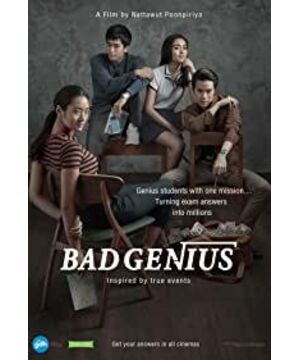" are limited to the campus, the scenes are simple, and the story is not complicated. Although many people describe the look and feel of this film as "spy movies" and "royal thieves", there is only one thing in the bottom line - cheating. But it still found a special way to complete the theme of youth films: growing pains.
The beginning of the story is also quite conventional: it is the arrival of an outsider that changes everything. Although Lin's actor has a "high-level beauty" that the fashion circle loves, the setting in the film is a girl who is not good at dressing up and has a high IQ. On the first day of school, a warm and sweet girl took the initiative to show her favor. It successfully broke the barrier of newcomers and integrated into the new environment.
-------From here on, the difference from ordinary youth films has been officially opened---------
In order to allow Grace to stay in the beloved drama club, Lin agreed to help her cheat for the first time. The explanation here is very interesting. What makes Lin tempted is not a cup of milk tea every week or any material reward, but the title of "Mr. Xiao Lin". On the one hand, it also lays the groundwork for the change at the end.
But under Grace's request, Lin made a clear rejection without hesitation: I have paid enough for you.
In the middle, Lin went through a process of "blackening", helping more people to cheat, acting more simply and sharply, and doing anything to achieve her goals. She sees the injustice and is determined to challenge it: if you collect sponsorship fees, I will earn it back on my (cheating) skills; if you don’t let me study abroad, I will also use my (cheating) skills to make the money earn.
In the end, I will agree to cheat in a large international exam, and it has nothing to do with friendship (clearly expressing refusal intention at the hotel front desk), more like a sudden joke: a perfect cheating method suddenly appeared, I want to come as a genius Saying that the reason it's really worth the risk is "I can". The temptation to practice one's own ingenuity and gain wealth and leapfrog at the same time is too great for Lin.
The three cheating levels are clear and rich, and together with the self-consciousness of the protagonist, the growth of the protagonist is also progressive, gradually plump and thick: from passing an eraser on the sole of a shoe for a good friend (the conventional "top student" ends at this step), to for the sake of good friends. The subsidy family passed on the answers to a group of rich second-generation children with piano fingering, and then "played big" in order to prove their ability. The film skillfully uses the narrative strategies of genre films to establish a "genius girl" with clear goals, outstanding execution, and boldness.
In Lin's perception, cheating is feasible because it is essentially inaccurate to any People cause harm, Grace and the minibus get new toys, she gets money and satisfaction, parents are happy, teachers are relaxed, it is a win-win situation for all parties.
But she overlooked one point: the damage is the fair relationship in the small society of the school. It is very likely that she subconsciously tacitly acquiesced that the world is unfair, but she is not on the side of the victim, but on the side of the beneficiary, and of course she enjoys the favor and financial support given by the school leaders.
When she first decided to cheat, there was a crucial turning point when she discovered that the teachers' so-called "opening a small stove" meant leaking exam questions. As Lin, who has always enjoyed the "privilege of blue-chip students", for the first time, she felt that her rights were violated. So she used her own way to counter infringe on the power of the school.
If we talk about the mature use of the genre of youth films, the script with no extra lines, the exciting editing and tight rhythm, the wonderful performance of a group of young actors with excellent acting skills in 1996, and minutes can be regarded as commercial The beautiful shots of the advertisements are technically good-looking, and the social reflection on the education system and class differences is a higher-level idea, so what makes "Genius Gunner" jump out of "generally excellent" is that it is under the theme of education. Deeply rooted humanistic care.
While domestic youth films are still striving to be "passable" at the technical level, there are already quite a few small-cost masterpieces abroad that have entered a level deeper than "youth", such as "Juno", "The Wallflower Boy", "Me and Me" Earl and The Dying Girl are all very delicate and interesting youth films, but at the same time they are not only youthful, but have full ambitions for larger textual propositions, making them full of youthful atmosphere. In addition to the innocent and childlike appearance, it also gives the audience warmth to think, and can leave at least one impressive shot.
And "Genius Gunner" did it too.
Not just visually, it left one of the most impressive scenes I've seen in theaters this year (it's no exaggeration to say that the only scene I've seen and remembered in a domestic youth film, is " are you crazy!"). When Lin was most obsessed, when the slender hands of the girl tapped the fingering of classical music on her thighs, I could still feel the warm light of classical beauty from the "crime scene" representing "mistake" .
At the same time, it also uses very full and sincere humanistic care, like a big sister next door with excellent character and learning, and hugs you unexpectedly.
Most of the people who don't like "Genius Gunner" are obsessed with "too politically correct endings and sudden changes".
However, this is precisely the point that highlights the skill of the screenwriter.
If it is a mediocre second-rate screenwriter, it is not difficult to complete the beginning of "an invasion by an outsider changed everything", and then it is easy to write "be tempted to step into the abyss", slam, and finally use a parent or classmate, etc. The story of someone who suddenly changed to wake up the protagonist and finally changed his mind.
The difference between mediocrity and excellence lies in the last step from seeing whether a mountain is a mountain to seeing whether a mountain is still a mountain.
During the first half of the movie, I couldn't get rid of one question: Why is she so young, how can she be so sure when she makes any decisions? Whether it was her father's disappointing rebuttal, or her righteous questioning to the school leader, or when she knew that the other party was the most honest and loyal Banker but insisted on dragging him into the water, she never had the slightest doubt.
She suddenly reacted later, because she was a genius.
The difference between genius and mortal, in addition to the ability to solve problems, there is also a crucial point is the difference in the degree of self-discovery.
Just like the four protagonists in the movie, the characters of Grace and the minibus are not only poor students, but also people who are drunk. In front of Lin, they and the group of vaguely rich second-generation behind them were actually not much different from humans and apes.
This is a protagonist with a high degree of autonomy from start to finish.
Her setting is a genius. The camera is very stingy about the motives and consequences behind each of her actions, but it has not stopped capturing a lot of her frowning eyebrows and fine sweat on her forehead, reminding the audience that every time The deepest sense of fear and moral sway that a person has. This is also why many audience members have their hearts racing and panicking when they walk out of the cinema, as if they were cheating when they went back to school.
(Insert why I don't like Benedict Cumberbatch's various "genius" performances, he figured out a set of stylized pseudo-genius-style performances, that is, the ramble of no one else and the expression that always lacks hierarchy. The geniuses he performed are all the same, and they give the audience a strong sense of distance, but they don't know that geniuses are human beings with a normal physiological structure. In contrast, Hawking in The Theory of Everything, Einstein in Genius, and Beautiful There is no other actor who ruins so many talented characters with rigid performances like Nash in Mind.)
And Judimont Joan Charongsuin's performance lives up to the title of the movie at all.
A true genius is not someone who can memorize how many long and tongue-in-cheek lines in one minute faster than someone's mouth. No one can learn all knowledge (including sports) more skillfully than Lin, so under the school system, her like a duck to water affects her pragmatic and almost ruthless character. With her sharp judgment, incredible execution, and a level of composure beyond her years, it's easy to mistake her for a pragmatist. As everyone knows, she is the biggest idealist in the movie.
The whole "Genius Gunner" tells the story of how a girl who has nothing but intelligence, tries to challenge her own destiny through step-by-step decisions. Although from a hunter's point of view, she alone has leveraged the invigilation mechanism of the entire US entrance examination, but when you think about it, every action she does is for herself, to test herself, to challenge herself, and to change her destiny All right, this is a real "human" role.
At the end,
Banker said: You think, the choice is yours.
Lin replied: Yes, you are right, the choice is mine.
Lynn is flawed. Blurring the boundaries of fairness and justice in her highly purposeful plan is a deadly one. Many viewers were distressed by the fall of Bank, his ignorant innocence when he appeared, and blamed Lin for his tragedy.
However, a person who is truly full of ideals and brilliance, after recognizing the true face of human nature and society, still has sufficient trust and understanding of the latter.
Most importantly, an idealist does not give up.
Therefore, Banker, who lost his reporting qualifications, was "deceived into a pirate ship"; after losing his qualifications to stay in the United States, he began to "cheating" again. Is he like this, or the poor boy who lost his footing in your eyes? Doesn't it remind you of those middle-aged uncles who like to talk about the passion when they were young, but are now oily and slippery? In this way, even if he successfully went to Singapore to study for a Ph.D. and got a high-paying job, as long as he encounters bigger difficulties in his life, his cowardice and weakness will inevitably pander to evil and injustice.
On the other hand, Lin, when she was going well, when she went astray, when she was on the verge of collapse... Has she ever had one, even a small thought, to castrate herself?
She saw in Grace the minibus the unalterable gulf of fate, in Banke how easily a pure and kind soul could be tempted to go astray, in her father how integrity and cowardice were useless, in the headmaster Seeing the more ferocious and evil rules for adults...
Then she chose to embark on the road of education, and once again tried to use her own power to leverage a much larger state mechanism than her. This is not to pursue the abruptness of "political correctness", but from the "Mr. Xiaolin" at the beginning of the film, it has long been inevitable.
Why is "The Gunslinger" the best teen movie? Because it is rigorous and fair in the framework of the genre, it is almost impeccable, and beyond the genre, no matter what dimension of critical perspective, it is still a masterpiece that can be criticized. A long time ago, we also had works like "Sunny Day", "Summer Palace", "Waiting Alone". Unfortunately, on the way to commercialization, domestic youth films were lost.
Recently, the youth genre films in Chinese-language films, even the above-average "My Girls' Generation", have nothing left except the ignorant first love of handsome men and beauties. In particular, the country has always liked to use a group of over-aged "boys and girls" to interpret the so-called junior high school students, which has revealed a great lack of self-confidence in themselves from the bottom up ("Little Play Bone" has allowed people all over the country to see the acting skills of children in their teens. Not worse than the top traffic, I believe the situation will improve in the future).
An excellent big screen work cannot stop at "standard". An excellent youth film can't stop at "positive youth". The big screen is not a training ground, but many "youth films" that are content with fancy audio-visual language skills, indiscriminate stories, and hundreds of millions of box office by relying on a few traffic-level Huadan fresh meat can still emerge one after another. The extraordinarily tolerant masses condone a bunch of market deformities.
View more about Bad Genius reviews











